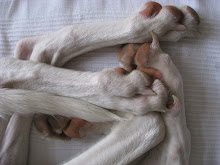2011-05-29
2011-05-11
Cans Eivissencs Solidaris








The project for solidarity.
A group of people has started a project in Ibiza to promote the Ibizan Hound outside the scope of hunting, as these dogs are usually known in the island and the rest of Spain. But abroad, the “ca eivissenc” is not used for hunting, among other things, because this practise is banned in many countries. This dog is used basically as a pet, for racing, for agility competitions, and other sports or leisure tasks, which are almost unknown in Ibiza and the rest of Spain.
The project aims an approaching between dogs and children because, as a consequence, children will understand and love these dogs. The project also wants to develop a series of cultural, scientific, social, and touristic activities to promote this Ibizan autochthonous breed that has been extended in many countries that have official clubs and make exhibitions, contests and sport competitions. For the promotion and development of the activities under the project, four main areas are created: Rescue, Therapy, Spreading and Cultural promotion and Scientific.
In this case, the aim is that children learn how the breed is, how it is used, and the role that the Ibizan Hound can have both in the island and around the world. Details of its origin and history are explained as well as the features that can make this dog unbeatable in the rescue of missing people. So, children may approach to a canine breed that is one of the most primitive in the world with around 6,000 years, according to different archaeological samples. As a primitive dog, it has a specific behavior that requires special handling. It is a docile dog but, at the same time, it has a great character and temperament; it is quiet, but also agile and needs a lot of physical exercise; it is obedient, but likes to be independent as unconnected to his owner, like the ancient dogs of pharaohs, from whom this animal has herited its eastern deep glance that attracts fans around the world.
